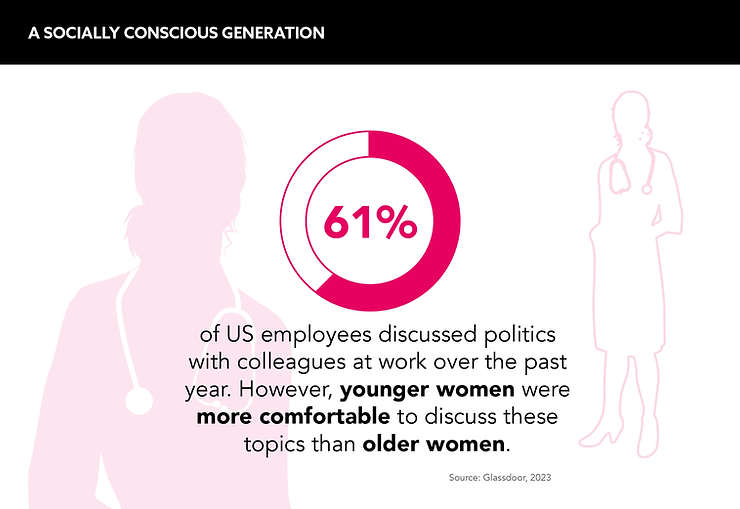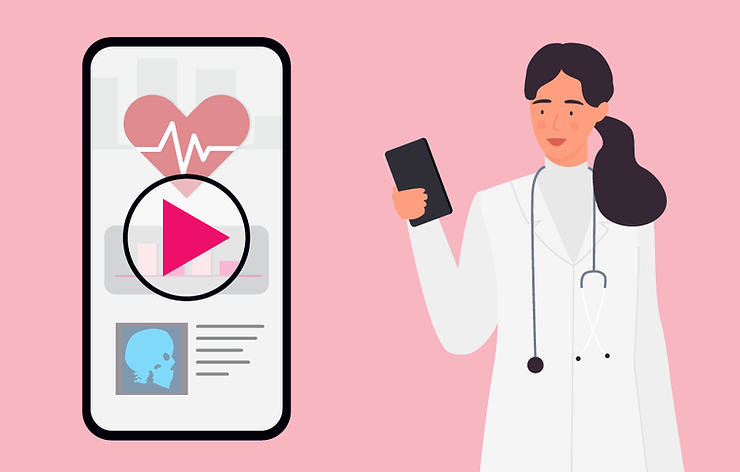A new generation of doctors is making their way into the workforce, but is the pharmaceutical industry ready to change its tactics to engage these younger HCPs?
Words by Jade Williams
As a new year approaches, so does a new chapter for businesses around the world. As they look inward at their workforces, many companies may find that the number of Generation Z employees – those born between 1997 and 2012 – is steadily increasing, while the number of baby boomers is in decline.
According to Glassdoor’s ‘2024 Workplace Trends’ report, next year could be the first time Gen Z overtakes boomers in the workforce. For the pharmaceutical industry, this presents quite a challenge: how can pharma teams engage with this new generation when they’re already struggling to get through those currently in situ?
Who are Gen Z?
The industry is certainly not alone in trying to figure out how best to engage with Gen Z. As with any new generation, they have their own unique likes, dislikes and motivators for companies to decipher.
Broadly speaking, the younger HCPs entering the market are less likely to attend congresses, more likely to treat their patients remotely, more passionate about social injustice and more likely to have a negative perception of pharma.
“I don’t think they’re that interested in industry,” comments Dr Harry Gibbs, Programme Director, Outpatients Programme, and Deputy Director, General Medicine, The Alfred Hospital, Melbourne. He notes that “they can get their [medical] information instantly from elsewhere”, so why should they attend lengthy congresses or sit down with pharma sales reps?

Soft skills
The younger generation of HCPs expects more from pharma than just drug information, which they can find online in seconds.
Dr Azmain Chowdhury, MD, NHS, a young doctor himself, explains that “our generation are more focused on team dynamics, leadership and communication skills. We want to make sure we can get all our medical information across to patients as best as possible”.
Our generation are more focused on team dynamics, leadership and communication skills
With this in mind, rather than simply providing HCPs with basic drug information packs, the industry could connect with Gen Z doctors by appealing to their willingness to become better versions of themselves.
“I’m not sure pharma does enough soft skill building for HCPs,” argues Ravi Pawa, former Country Medical Director at a pharma company in the UK, demonstrating the need for an enhanced offering.
This could include providing training on how best to administer a new drug to patients, or how best to inform patients about their upcoming treatment plan.
Digital natives
As well as improving face-to-face and one-to-one interactions with HCPs, Chowdhury suggests that the industry could do more to improve its digital content for young doctors. With the rise of TikTok and other short-form video hosting platforms, this generation has come to expect a certain level of snappiness from those producing content for them.
“A lot of content I’ve seen from pharma is very corporate in style,” notes Chowdhury. “You can tell the aim is to tick a marketing box rather than to actually engage people.” If Gen Z can tell the difference between a genuine effort and an inauthentic one online, pharma will need to work harder to create materials that are both real and compelling.
Working with customers, in this case doctors, can be hugely beneficial in creating better content strategies. Gen Z wants to be active participants in their own trajectories, so they’re keen to work up the chain to improve what’s on offer to them and their colleagues.
Socially conscious
Another way companies can get through to young HCPs, which may not have been as important a few decades ago, is by showing their commitment to addressing health inequities faced by patients.
“In medical school now,” Chowdhury comments, “there’s much more focus on the social determinants of health and creating equitable healthcare.” Therefore, marketing and medical campaigns should show how the company has thought about access and how the new therapy could address an inequity that currently exists.
“I’m of a generation where we’re just a lot more vocal,” states Chowdhury. And it’s all for the better. Gen Z will not be afraid to debate and challenge the industry on whether its offerings meet the complex needs of healthcare systems and patients. Companies that are not up to the challenge are at risk of being viewed negatively.
Poor perceptions
All companies will need to adapt to meet the needs of Gen Z, and inspirational marketing guru Simon Sinek believes in the power of ‘start with the why’ as a good place to start.
The ‘why’ in pharma is obvious to most: to help people live longer, better lives, but more needs to be done if companies want Gen Z to believe they are committed to this mantra.
“There’s still a perception that pharma is the dark side,” laments Pawa. “It’s disappearing, but we have to get in as early as possible to alleviate that concern.” To this end, she suggests that the industry should do more to work with universities and colleges at the very early stages of doctors’ careers to discuss all aspects of drug development and stop this cycle of negativity from beginning.
There’s still a perception that pharma is the dark side
What can’t be stopped is the new wave of doctors entering the workforce. With a determination to evolve, collaborate and change for the better, pharma will be able to forge bonds with this new brand of doctor. Whether it’s in 2024 or beyond.









